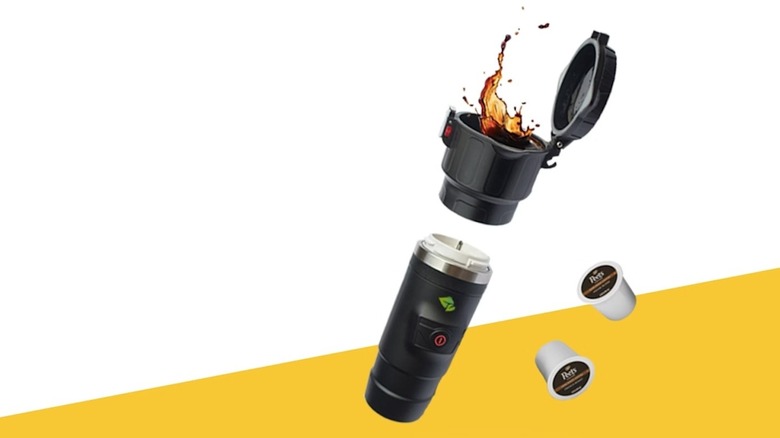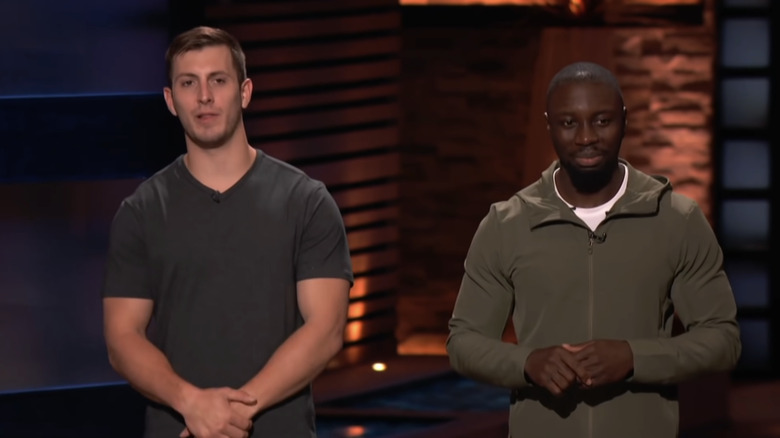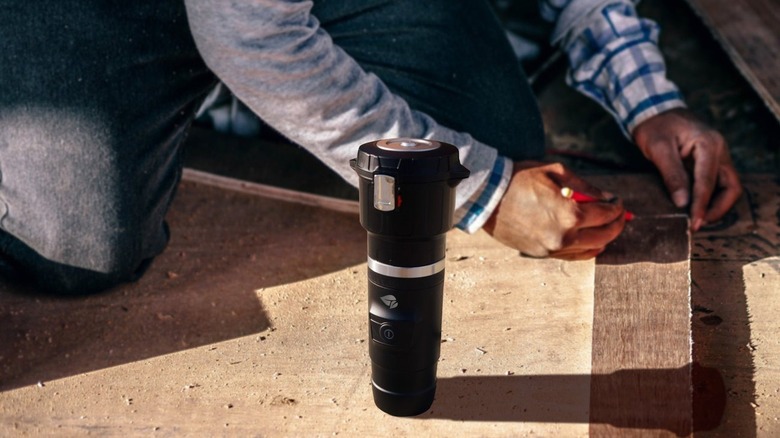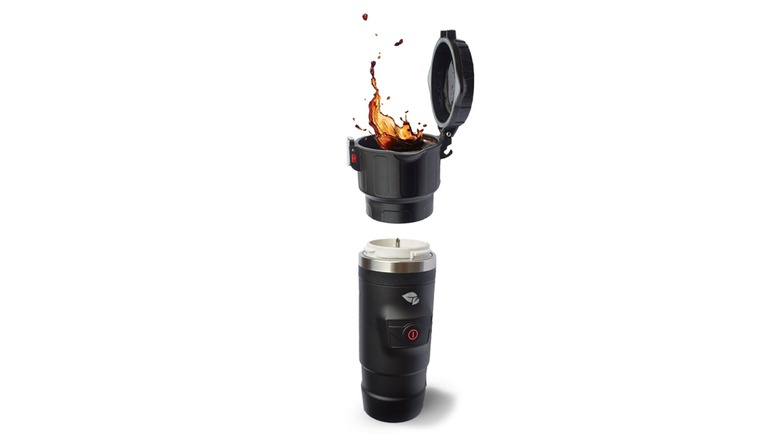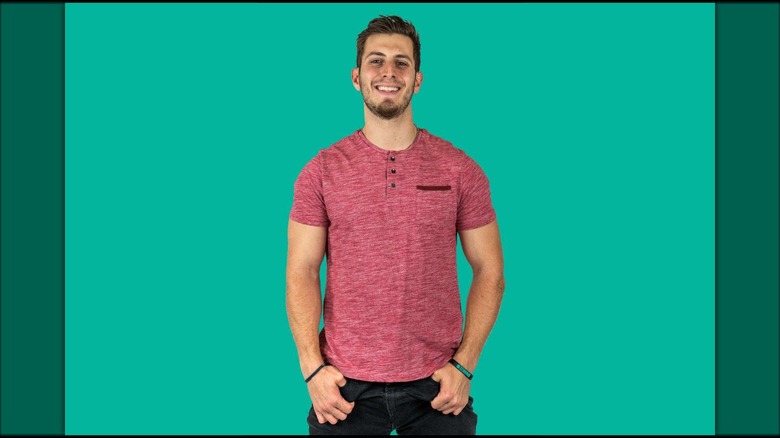What Happened To The Brümachen Coffee Maker From Shark Tank Season 12?
On January 22, 2021, the 11th episode of 12th season of "Shark Tank" premiered on ABC to just over 4.2 million live and same-day viewers. The second of four pitches was an attempt to sell the Sharks on the Brümachen, a portable coffee maker for brewing Keurig-style coffee pods on the go. The Sharks seemed impressed by the idea of the product as well as the immigrant story of co-founder Kweku Larbi. However, they also scoffed at the sky-high valuation that the entrepreneurs were asking for in light of only having sold through Kickstarter preorders so far and found the device itself complicated to use. Larbi and business partner Ross Smith, a full-time social media influencer, left without a deal.
During the pitch, Larbi claimed that all of the Kickstarter orders had been fulfilled. Upon closer examination, though, that does not appear to be the case, with comments on the Brümachen Kickstarter page crying foul over unfulfilled orders, the coffee makers that did get sent out arriving broken, and an overall lack of communication.
In light of all this, what exactly happened with Brümachen? Read on to find out.
What happened to Brümachen on Shark Tank?
TikTok influencer Ross Smith and civil engineer Kweku Larbi entered the proverbial "Shark Tank" seeking $1 million for 10% of Brümachen, their company built around a portable coffee brewer and biodegradable coffee pods. The pitch was pretty simple: That Brümachen, which can be powered by a car power adapter/"cigarette lighter" port, bridges the gap between brewing coffee and spending extra to buy freshly brewed coffee, allowing you to brew on the go. Needing just water and a coffee pod (like a Keurig K-Cup), they said that it brews a cup of coffee in five minutes. Smith and Larbi also added that Larbi had developed a biodegradable pod to stop plastic coffee pods from filling up landfills.
The Sharks initially seemed intrigued based on the product itself, the margins ($120 retail/$38 to make), and Larbi's immigrant story, having left Ghana at 17 years old. However, learning that the only sales to date came in the form of $42,000 on Kickstarter (about 600 units) dampened the Sharks' enthusiasm. Prompted by guest Shark Daniel Lubetzky, Kevin O'Leary went off on the entrepreneurs for valuing the company at $10 million, which led to Smith touting his social media reach, explaining that he came on after the Kickstarter.
Mark Cuban and Robert Herjavec opted out over the complexity of the product design and the overly steep valuation, with Lubetzky, Lori Greiner, and O'Leary dropping out for similar reasons. The sky-high valuation was clearly a stumbling block for all of the Sharks, even the ones who liked the product, so no deal was made.
Brümachen after Shark Tank
Kweku Larbi claimed on "Shark Tank" that all of Brümachen's Kickstarter orders had been filled, but that was not the case. In the most recent update on their Kickstarter page, dated January 7, 2021 — months after the "Shark Tank" episode was shot but over two weeks before it aired — Lorbi apologized for not being able to fulfill every order.
"Due to unexpected costs of shipping for such small quantities, we have been out of funds and apologize for the inconvenience," he wrote. "We are in the process of raising funds but at this point, are still only able to ship nationally. If you live inside the continental United States and did not receive your machine, please email us at info@brumachen.com. If you are outside of the United States, you will be first on the list to receive the machine once we have the funds raised!" The previous update, the text of which can only be viewed by those who backed the Kickstarter campaign, claimed in the subject line that all U.S. orders had been shipped as of July 16, 2020.
The Kickstarter page is filled with comments from unhappy backers, including several miffed by the "Shark Tank" segment, with one of them pointing out the lie about having fulfilled every order. Others pointed out that international customers got nothing, with replacements for American customers receiving priority. Among those who did receive their orders, the units arriving broken was a common complaint.
Is Brümachen still in business?
By all appearances, Brümachen is no more. Its website returns a "421 Misdirected Request" error and sets off browser/ISP security warnings due to it having an invalid security certificate. The company's social media pages are long dormant, with no updates to any of them since January 2021. Both the Facebook and Instagram pages have been pretty active, while the X, formally Twitter account has exactly one post, a reply to "Shark Tank's" Barabara Corcoran — who wasn't in the Brümachen episode — when she agreed with the other Sharks that the $10 million valuation was too high.
As for the company website, cached copies on the Internet Archive's Wayback Machine show that it will still be operational into 2023, with the last instance being from May 31 of that year. In the days after the "Shark Tank" episode aired, the site was set up to take orders, but by the following October, the listing for the coffee maker was changed to "sold out." By all appearances, this is not an operational company anymore, and it hasn't been one in a long time. Sure enough, Indiana business records show that the company was formally dissolved on December 5, 2021.
What's next for Brümachen's founders?
According to his LinkedIn page, Kweku Larbi finished up with Brümachen in "2021" with no month given. These days, his primary business appears to be Baxter Wood Company, a clothing company that he co-founded in December 2018 while also serving as the creative director.
"BAXTER WOOD is a vision born from the unique partnership of Kweku, an immigrant from West Africa, and Sarah, a native of northern Indiana," reads the company's "About Us" page. "Together, they set out to create an American fashion house that would not only simplify the wardrobe but also embody a timeless, country[-]inspired yet city-worthy style that defies fleeting fashion trends and stands the test of time." Alongside Baxter Wood, Larbi also runs The Greenboard, a non-profit organization that the Baxter Wood website describes as helping fund the construction of schools in developing countries by auctioning off "luxury items contributed by donors" that they "repair and upcycle."
As for Ross Smith, he's still a full-time social media influencer. As of this writing, the main product that he's promoting on TikTok is the "Hot Ones"-themed Hot Pockets that are available in the freezer aisle at your favorite grocery store.
